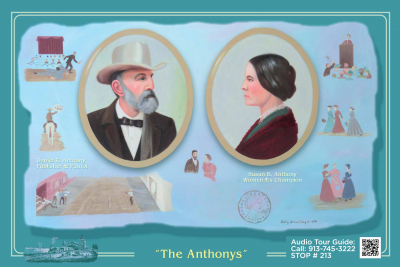Wayside Tour #13: The Anthonys - Susan B., Women's Champion and Daniel R., Publisher and Patriot
Wayside Tour #13: The Anthonys - Susan B., Women's Champion and Daniel R., Publisher and Patriot
Daniel Read Anthony, born on February 15, 1820 and his sister, Susan Brownell Anthony, born on August 22, 1824, had tremendous influence over the course of events in Kansas and the nation. Daniel's influence was felt through his newspaper and Susan was internationally known as an advocate of the early campaign for woman suffrage.
Daniel Anthony settled in Leavenworth in 1857 and founded the Leavenworth Conservative Newspaper in 1861. In January 1861, Colonel Anthony printed a special report announcing Kansas's statehood. Since Leavenworth was the western ending point of the telegraph, Colonel Anthony rode thirty-two miles on horseback to Lawrence to inform the territorial legislature of the news.
Daniel Anthony helped to form the Seventh Kansas Cavalry and was commissioned as a lieutenant colonel. During the Civil War he commanded a brigade in Tennessee.
In 1871, Colonel Anthony purchased the Leavenworth Times, the oldest daily newspaper in Kansas. During this time, frontier editors of strong convictions, like Colonel Anthony, had to be willing to defend themselves. Due to an article Colonel Anthony wrote, a rival publisher, R.C. Satterlee of the Kansas Herald, suggested that Colonel Anthony was a coward. The two men met on the street and Colonel Anthony demanded a retraction, which Mr. Satterlee refused to do. The men exchanged gunfire and Mr. Satterlee was mortally wounded. A jury of his peers acquitted Colonel Anthony.
In another incident in 1875, Colonel Anthony was severely wounded when William Embry, editor of the Daily Appeal, fired at him when he entered the Leavenworth Opera House. Colonel Anthony was not expected to live and Susan came to be with her brother. Colonel Anthony survived and lived to the age of 80. He died of natural causes in 1904. The Anthony Family continued to publish the Leavenworth Times until the late 1960s.
Susan Anthony was a schoolteacher who, after meeting Elizabeth Cady Stanton in 1854, determined to devote her life to the struggle of women's rights. She became internationally known for her work as a suffragist and was the foremost advocate for women's rights in America. Miss Anthony visited her brother at this home on the Esplanade on numerous occasions and lived in Leavenworth for several months in 1865 and helped edit the newspaper.
In 1872, in a plan to test the 14th Amendment of the Constitution which granted citizenship to black males, Susan B. Anthony registered and voted in the presidential election. She was arrested and put on trial. The judge directed the jury to bring a verdict of guilty and impose a $100 fine. She refused to pay it but the judge declined to put her in jail.
Miss Anthony traveled across the country campaigning for the rights of women often lecturing in Leavenworth. In 1875 she spoke at the Occidental Hall in Leavenworth. Admission to her lecture was 25 cents.
She lobbied every session of Congress from 1869 until her death to persuade lawmakers to accept a suffrage amendment to the Constitution. The 19th Amendment of the Constitution, granting women suffrage, did not pass until 1920, a hundred years after Susan B. Anthony's birth and 14 years after her death in 1906. At the time of her death women could vote in only 4 states, but Susan, more than any other, had opened the way for the adoption of the 19th Amendment. It was introduced in the U.S. House of Representatives by Miss Anthony's nephew. Representative D. R. Anthony, Jr. of Leavenworth.
Miss Anthony was twice honored on U.S. postage stamps, and on the dollar coin minted in 1979. She wrote a book that consists of two volumes and nearly 2000 pages called "The History of Women's Work. She has been called the greatest woman this country has produced. She saw the vote as a symbol of women's emancipation and independence, as well as the indispensable condition of true republican government.



